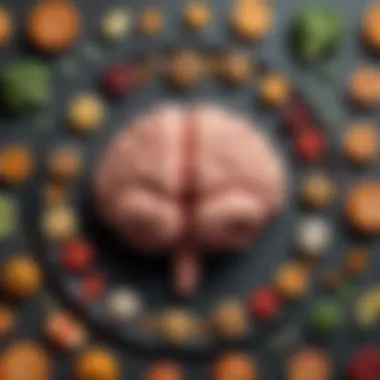Understanding Loss of Appetite: Causes and Effects


Intro
Loss of appetite is a puzzling issue, often dismissed as mere fussiness, yet it carries deeper implications that can affect overall health. Whether it's tied to a fleeting emotional phase or a more chronic condition, understanding the roots of this phenomenon is critical. It surfaces in various contexts, from childhood to old age, manifesting as a symptom rather than a standalone condition, and ties into the intricate dance of physical and mental health.
This article seeks to unravel the complexities surrounding loss of appetite. By dissecting its various causes — physiological, psychological, and environmental — we aim to capture the nuanced picture of how appetite serves not just a functional need for nourishment but also plays a significant role in one’s mental well-being.
Identifying the underlying causes is not merely an academic exercise; it serves vital purposes. Understanding why one might stop feeling hungry offers pathways to effective management and underscores the importance of seeking help when necessary, as prolonged loss of appetite can lead to poor nutrition, weight loss, and even exacerbate existing health issues.
Furthermore, this exploration into the topic brings to light the implications loss of appetite can have on individuals' lives, urging us to consider it a signal that something may be amiss. On our journey through this article, we'll dig into various aspects that contribute to appetite loss, the broader scope of its implications, and the strategies for addressing it.
Defining Loss of Appetite
The concept of loss of appetite isn't just a casual missing of a meal; it plays a significant role in understanding one's overall health. In this article, we explore its various dimensions, ranging from physiological to psychological factors. Understanding loss of appetite can shed light on underlying health issues, and addressing it early can help in mitigation and recovery. This makes it essential to define what loss of appetite truly signifies.
Loss of appetite, or a significant reduction in the desire to eat, often leads to decreased food intake which, over time, might manifest in noticeable weight loss and nutritional deficiencies. It's not merely an inconvenience; it can signal serious underlying conditions that warrant investigation. We delve deeply into its medical implications, the psychological aspects tied to it, as well as socio-cultural influences that can exacerbate the loss of appetite.
Clinical Significance
The clinical significance of loss of appetite cannot be overstated. It serves as a red flag for medical professionals, signaling potential health problems that range from physiological ailments such as infections to mental health challenges like depression. By recognizing this symptom, healthcare providers can initiate further evaluations, leading to timely interventions that ultimately contribute to recovery. Loss of appetite may seem benign, but its implications are far-reaching, particularly when it comes to patient outcomes.
Types of Appetite Loss
Understanding the various types of appetite loss provides more context to this condition. Appetite loss is not a one-size-fits-all issue and can take different forms, each with its unique features and trajectories.
Acute vs. Chronic Loss
In the scope of appetite loss, distinguishing between acute and chronic conditions is crucial. Acute loss of appetite refers to a sudden onset that typically lasts for a short period, possibly due to temporary illness or stress. This type often resolves when the underlying issue is addressed, making it a common occurrence in everyday life. On the other hand, chronic loss of appetite persists over an extended period – often for six months or more. This chronicity signifies the potential for deeper issues, such as long-standing diseases or chronic psychological conditions. Recognizing the key characteristic of each type helps in the assessment, guiding healthcare providers in choosing the appropriate course of action. For instance, acute loss might not necessitate extensive evaluation, while chronic loss often requires a thorough diagnostic approach.
- Acute Loss Characteristics: Temporary, often linked with short-term stressors.
- Chronic Loss Characteristics: Persistent, often indicative of underlying health issues.
Understanding these distinctions can steer individuals toward seeking the necessary medical evaluation and management, making them an essential part of this article.
Selective Appetite Reduction
Selective appetite reduction diverges slightly from the above categories. This phenomenon occurs when individuals exhibit a diminished desire for specific types of food rather than an overall decrease. For example, someone might crave sugary snacks but turn their nose up at nutritious options like vegetables or protein.
The key characteristic of selective appetite reduction involves both a psychological and physiological interplay. This condition can arise from factors like sensory overload from the surrounding environment or previous negative associations with certain foods. This particular appetite shift could pose important health risks, as it often leads to the consumption of nutrient-poor foods and exacerbates any existing health conditions.
- Unique Features: Focused on certain food types rather than overall intake, possibly reflecting internalized biases toward particular tastes or cuisines.
The advantages of identifying selective appetite reduction lie in the potential for tailored dietary interventions. Understanding what drives these choices can help in addressing nutrient intake effectively, making it a valuable aspect of our overall discussion on appetite loss.
Physiological Causes
Understanding the physiological causes of loss of appetite is crucial. This aspect not only encompasses biological mechanisms but also provides insight into various health conditions that could inhibit one’s desire to eat. Knowing these causes can help better evaluate health conditions and target appropriate management strategies.
Gastrointestinal Disorders
Gastrointestinal disorders play a significant role in the experience of diminished appetite. Conditions affecting the digestive tract can induce feelings of nausea or pain, making the prospect of eating unappealing.
Nausea and Vomiting
Nausea and vomiting, two common gastrointestinal symptoms, can substantially contribute to loss of appetite. When a person experiences nausea, it creates an aversion to food—often perceived as a precursor to vomiting. The key characteristic of nausea is its immediacy; it often strikes suddenly and can persist, influencing a person’s eating habits for quite some time.
One advantage of discussing this topic in relation to appetite loss is its commonality. Everyone experiences occasional nausea, making it relatable. However, when chronic nausea occurs, which can be seen in conditions like pregnancy or gastroparesis, it may become an impediment to nutrition. It is important to recognize that there are ways to manage this through dietary adjustments and medications.
Inflammatory Bowel Disease
Inflammatory Bowel Disease, which includes Crohn's Disease and ulcerative colitis, presents another physiological dimension to consider. The key characteristic of this condition is its inflammatory nature, which can lead to abdominal pain and increased urgency to defecate, both of which can squash one’s appetite.
This topic is relevant because the chronic nature of IBD means that it affects many individuals over extended periods. It’s crucial to note that the inflammation can result in malabsorption of nutrients, leading not just to appetite loss but also to deficiencies. Strategies around this might include focusing on low-fiber diets during flare-ups to ease symptoms and foster a more positive eating experience.
Metabolic and Hormonal Factors
Metabolic and hormonal factors also play an essential role in the dynamics of appetite. Hormones like leptin and ghrelin are particularly influential, shaping hunger signals within the body.
Endocrine Disorders
Endocrine disorders, such as hypothyroidism or adrenal insufficiency, often disrupt this fine-tuned hormonal balance. The key characteristic here is that hormonal imbalances can lead to reduced appetite as the body struggles to regulate energy levels.
Including this in the discussion is beneficial, as endocrine issues are prevalent and sometimes overlooked when considering appetite. For instance, a sluggish metabolism due to hypothyroidism can dampen appetite, leading to unintended weight changes. It's essential, therefore, to explore treatment options that focus on restoring hormonal balance, which may help regain a healthy appetite.
Malnutrition
Malnutrition itself is a double-edged sword for appetite loss. When a person is malnourished, their body may not produce adequate hunger signals, leading to further appetite decline. The unique feature of malnutrition is its direct impact on physical health and vitality, which inevitably affects mental health as well.


Recognizing malnutrition as a factor in appetite loss is significant because it emphasizes the importance of comprehensive nutrition assessments. If one is already undernourished, they may find it increasingly hard to eat, thus perpetuating the cycle of loss. Addressing malnutrition through tailored dietary plans can be a pivotal step in managing appetite issues.
Neurological Influences
Neurological influences on appetite can be subtle yet profound. The brain’s response to various stimuli, whether from injury or disease, can heavily sway one’s desire to eat.
Impact of Brain Injuries
The impact of brain injuries on appetite is multifaceted. Damage to specific areas of the brain can result in changes to appetite regulations. The key characteristic of this aspect is that it can occur suddenly and unpredictably.
Incorporating this topic sheds light on how the brain and body work harmoniously. It's a reminder of the complexity of biological systems; loss of appetite is not merely a choice but sometimes a neurological response—one that may require substantial rehabilitation efforts to rectify.
Neurological Disorders
Neurological disorders, including conditions like Parkinson's Disease and multiple sclerosis, can significantly affect hunger drive. The key characteristic of these disorders is that they often come with not only physical but also cognitive symptoms, which can further hinder appetite.
This topic is particularly beneficial as it points out the intersection of physical and mental health. Understanding these influences can lead to more compassionate strategies in care, recognizing that the loss of appetite may not be reluctant but rather a consequence of the illness. A tailored approach, considering physical therapy and supportive care, can enhance a patient’s nutritional intake and, consequently, health.
Psychological Factors
Psychological factors play a substantial role in influencing appetite. They are like the puppeteers pulling the strings behind the scenes, affecting how we feel about food and eating. Understanding the psychological underpinnings of appetite loss can help in forming a more holistic view of this condition. This is essential not just for individuals grappling with appetite loss, but also for healthcare providers and families. By recognizing these influences, we can mobilize appropriate strategies that may counteract the negative impacts of this phenomenon on health, emotional well-being, and social interactions.
Mental Health Issues
Depression and Anxiety
Depression and anxiety often cast a long shadow on many aspects of life, especially in terms of appetite. When someone battles these mental health issues, food may seem less appealing than it normally would. Individuals may find themselves feeling a sense of dread at the thought of eating, or simply losing interest in it entirely. This specific aspect is crucial to consider, as it illustrates a direct link between psychological distress and nutritional health.
The hallmark characteristic of these conditions is their pervasive nature. They can turn life's pleasures, including food, into activities that feel burdensome rather than nourishing. Not only does this impact overall health, but it can also provoke feelings of guilt and shame, creating a downward spiral that can be hard to break out of. This makes the inclusion of depression and anxiety as a topic in the discussion of appetite loss particularly beneficial, as addressing these issues can lead to improved overall well-being.
Unique features of these mental health issues include their subjective experience. What one person finds overwhelming, another might not even notice. Therefore, while the potential advantages of understanding this link are immense — such as targeted therapeutic interventions — the challenges include the nuanced and often invisible nature of these conditions.
Stress-Related Appetite Changes
Stress can turn appetite into a rollercoaster ride, swinging wildly from one extreme to another. Some people might find themselves nibbling on snacks nervously, while others completely lose their desire to eat when stress strikes. This phenomenon showcases how external pressures can operate like a switch, altering a fundamental human behavior. It is a crucial factor in understanding appetite loss, especially in a world where stressors are omnipresent.
A significant characteristic of stress-related appetite changes is their immediacy; they can manifest almost instantly during moments of heightened emotional or mental strain. Considering this element brings understanding to how everyday pressures can lead to troublesome eating habits. A beneficial aspect of acknowledging this is that it opens the door to stress management techniques, which can improve not only hunger cues but also overall health.
On the flip side, the downside to stress-related appetite changes is that they can be cyclical. Stress can lead to poor eating habits, which in turn can generate more stress, forming a challenging loop that affects mental and physical health.
Eating Disorders
Anorexia Nervosa
Anorexia Nervosa represents a profound and troubling manifestation of appetite loss. This eating disorder is more than just a desire to lose weight; it embodies a relentless pursuit of thinness and an intense fear of gaining weight. This particular aspect is pivotal, as it highlights how psychological barriers can translate into severe behavioral changes surrounding food. The particular focus on Anorexia makes it a vital element of this conversation, drawing attention to the extreme consequences that appetite loss can have.
One of the defining characteristics of Anorexia is its capacity to distort self-perception. Those affected often view themselves as overweight, despite being dangerously underweight. This unique feature reinforces the importance of understanding the psychological drivers that contribute to such a dangerous relationship with food. The advantage of recognizing Anorexia in the context of appetite loss is that it promotes a discourse around recovery options and interventions that focus on both psychological and nutritional aspects.
Binge Eating Disorder
Binge Eating Disorder stands as another critical case study in understanding appetite dynamics. This disorder involves recurrent episodes of eating large quantities of food, often accompanied by a loss of control. With it comes an emotional aftermath characterized by shame and distress. This aspect contributes significantly to the discussion of appetite loss, unveiling how psychological discomfort can lead individuals to engage in somewhat paradoxical eating behaviors.
A notable feature of Binge Eating Disorder is the compulsive nature of eating as a coping mechanism. This can serve to distract from emotional pain, often resulting in a temporary relief that ultimately leads to more significant issues, including obesity and its associated health risks. Understanding Binge Eating Disorder within the framework of appetite loss is advantageous because it shines a spotlight on the need for integrated treatment approaches that address both emotional health and nutritional habits.
Overall, psychological factors serve as critical pieces of the puzzle in understanding loss of appetite. Their multifaceted influences can lead to a vastly different relationship with food, solidifying the need for comprehensive approaches in both diagnosis and treatment.
Environmental and Sociocultural Aspects
The influence of environmental and sociocultural factors on appetite loss cannot be underestimated. These elements play a pivotal role in shaping individuals' eating behaviors and their overall relationship with food. Understanding this facet allows for a more holistic view of appetite loss, which goes beyond just medical or psychological explanations.
Cultural Influences on Eating Behaviors
Culture significantly molds how individuals perceive and respond to food. Different cultures have unique culinary traditions, rituals, and social norms surrounding eating. For instance, in some communities, food serves as a social glue; gatherings revolve around meals, and the act of sharing food is a cherished value. In contrast, other cultures may prioritize efficiency and convenience in eating, impacting how meals are approached.
Consider the Mediterranean diet, with its emphasis on fresh fruits, vegetables, and communal meals, which often contributes to a positive relationship with food. On the other hand, more fast-paced environments may foster poor dietary choices, leading to a decrease in appetite due to a lack of positive associations with food. As a result, individuals who are part of a culture that stigmatizes overeating might develop aversions or internal pressures, thereby impacting their appetite negatively.
Social Isolation and Its Effects
Isolation's impact on appetite is another layer of complexity that deserves attention. The effects of loneliness can gnaw at a person's mental state, leading to significant changes in appetite. A typical scenario most can relate to involves individuals who stop socializing: as their interactions diminish, so does their motivation to prepare or enjoy meals. Shared meals can conjure memories and foster a sense of belonging; without that, eating often feels like a chore rather than a joyful activity.
"Connection with others often enhances not only the pleasure derived from eating but also encourages regular meal consumption."
Social gatherings often reintroduce an appetite for food through enjoyment and positive reinforcement. However, when a person isolates themselves, they may find it increasingly hard to motivate themselves to eat, creating a vicious cycle of decreased intake and social withdrawal.
Implications of Loss of Appetite


Loss of appetite can seem like a simple issue, yet it often marks the beginning of a series of substantial health concerns. The implications stretch far beyond just wanting less food. Understanding these ramifications is crucial for addressing not only the physical toll but also the mental and social challenges that accompany this phenomenon.
When an individual experiences loss of appetite, the body can misfire in a multitude of ways. Each implication creates a ripple effect that significantly impacts overall health. This section explores how nutritional deficits and mental health consequences weave together in a complex web, affecting one's quality of life and reinforcing the need for a thorough approach to evaluation and intervention.
Nutritional Deficits
Impact on BMI
The relationship between loss of appetite and Body Mass Index (BMI) is pivotal. A decrease in appetite usually leads to reduced intake of essential nutrients. This drop can result in a significant decline in BMI, which can be troubling for those already at risk of being underweight. The key characteristic of this aspect is its direct correlation with body weight and overall health. Low BMI, as a result of decreased appetite, often signals potential underlying medical conditions.
Falling below a healthy BMI bracket can have adverse effects on physical health. Not only does it diminish muscle mass, but it can also hinder immunity and increase the risk of complications. This is why monitoring BMI is not only a health metric; it’s a vital part of understanding the broader implications of appetite loss. The unique angle here is the duality of BMI—while it helps assess body composition, it can also reflect an individual’s mental state or underlying health issues. On the flip side, focusing solely on BMI might not always provide a complete picture of an individual’s nutritional status or overall well-being.
Malnutrition Risks
Malnutrition is another glaring risk associated with loss of appetite. It underscores the profound effects of not consuming enough food over a period of time. Here, the focus is on how a diminished appetite can lead to deficiencies in essential vitamins and minerals, which can impair bodily functions.
The prevalent characteristic of malnutrition is its insidious nature; it can creep up unnoticed until more severe health issues surface. This risk is especially concerning for vulnerable populations such as the elderly or those with existing medical conditions. The unique feature of malnutrition is its ability to manifest in various forms—under-nutrition, over-nutrition, and even hidden malnutrition where nutrients are inadequate despite adequate caloric intake.
One must balance the advantages and disadvantages of this concept: whilst it's beneficial to recognize malnutrition as a serious consequence of appetite loss, it’s equally important to focus on preventive measures before conditions escalate.
Mental Health Consequences
Link with Mood Disorders
The interplay between loss of appetite and mood disorders deserves careful examination. Loss of appetite is often a symptom that can lead to or exacerbate conditions such as depression and anxiety. There’s a powerful bidirectional relationship where mood can influence eating habits, leading to a downward spiral of both psychological and physical health.
The critical characteristic of this link is the profound impact mood can have on one’s perception of food. An individual with a depressive state may see food as unattractive or even unappealing, creating a vicious cycle of negative feelings associated with nourishment. Recognizing that this relationship is not merely coincidental but a crucial aspect of health is vital for effective treatment strategies. On the downside, not addressing this connection can perpetuate mental health challenges, creating a cycle that is hard to break.
Social Withdrawal
Social withdrawal is another significant consequence tied to appetite loss. This aspect highlights how the simple act of eating can serve as a social function. When someone stops participating in meals or social gatherings that involve food, it often leads to isolation. Losing one's appetite can result in a withdrawal from these interactions, further alienating the individual from their support networks.
The key characteristic of social withdrawal is its compound effect; isolation can lead to worsened mental health, creating emotional distress that can further diminish appetite. One noteworthy feature is that this withdrawal is often subtle; the individual might not fully recognize how this behavior affects their relationships until it’s too late. It might seem trivial, but acknowledging the mental and emotional toll of missed meals can reveal deeper social implications. Furthermore, creating awareness around this consequence is crucial, as addressing it could lead to enhancing both appetite and social well-being.
In summary, the implications of loss of appetite paint a picture of interconnected issues that span nutrition, mental health, and social dynamics. Recognizing and addressing these components is crucial for effective management and promotion of holistic health.
Evaluation and Diagnosis
Understanding loss of appetite is not just about identifying the symptom itself but rather understanding its wide-ranging implications on health and well-being. Evaluation and diagnosis play a crucial role in figuring out why someone isn’t eating properly. This section delves into how healthcare professionals assess this condition, allowing for targeted treatments. The effective examination of loss of appetite encompasses both clinical assessments and diagnostic testing, making it vital in addressing the core issues behind the symptom.
Clinical Assessments
Patient History Examination
The patient history examination forms the backbone of the evaluation process when someone reports a decrease in appetite. This initial assessment is all about peeling back the layers of an individual's medical and personal history. It's like digging through a box of old photographs; each detail can spark a memory that holds critical information.
One key characteristic of patient history examination is its comprehensive nature. It typically combines both past medical illnesses and current lifestyle factors. This makes it a popular approach in understanding appetite loss from a holistic perspective. Importantly, a detailed history can signal the involvement of psychological elements, medication side effects, or even cultural dietary preferences.
A prominent advantage of this examination is its ability to sift through various interconnected factors that contribute to changes in appetite. Yet, it has its limitations. For instance, relying solely on the patient's account can sometimes lead to misunderstandings if the patient lacks insight or is reluctant to discuss their symptoms. Nevertheless, the patient history examination remains a vital step in diagnosis, shedding light on the root of the issue.
Physical Health Evaluations
Physical health evaluations act as a follow-up to the patient history examination, offering a more direct assessment of the bodily changes associated with appetite loss. These evaluations typically include observations of general health, signs of malnutrition, and specific physical examinations, resembling a detailed inspection of a car before a long journey.
A key aspect here is that physical health evaluations reveal tangible indicators that are often overlooked in a casual discussion. For instance, doctors may note weight fluctuations, muscle wasting, or vital signs that can all point to underlying medical conditions. This practical, hands-on approach not only supports the findings from the patient’s history but also provides immediate clues regarding potential ailments.
The unique feature of physical evaluations is their ability to issue a red flag for issues that might not be readily apparent through symptoms alone. However, one drawback lies in their reliance on clinical expertise; misinterpretations can occur if evaluations lack a thorough context.
Diagnostic Testing
Diagnostic testing is the next step in confirming suspicions raised during clinical assessments. This phase utilizes objective data gathering methods that range from blood tests to imaging techniques. The goal? To get a clearer picture of what’s happening beneath the surface.
Blood Tests
Blood tests are crucial in diagnosing not just appetite loss, but the underlying conditions that might contribute. These tests can check for nutrient deficiencies, hormone levels, and various markers of illness, similar to examining a master blueprint to see what’s gone wrong in the engineering.
One major advantage of blood tests is their ability to offer precise, quantifiable data—far more concrete than subjective assessments. For example, low levels of vitamin B12 can directly cause appetite problems. By pinpointing specific deficiencies or imbalances, health professionals can devise targeted interventions to address the appetite loss.
However, there's a downside; even comprehensive blood tests can sometimes miss subtle issues that aren't detectable through standard panels, which may necessitate further testing.
Imaging Techniques
Imaging techniques serve as a more visual method for understanding the causes of appetite loss. Techniques like ultrasounds, CT scans, or MRIs provide a window into the internal workings of the body, helping to identify structural abnormalities, tumors, or other physical blockages that could influence appetite.
The significant characteristic of imaging techniques is their non-invasive nature, allowing for thorough examinations without the need for surgical procedures. This added layer of safety makes these techniques a preferred choice for doctors concerned about the patient's well-being.


Nonetheless, imaging is not without drawbacks. The process can be costly and may involve waiting periods for results, which can delay necessary treatment.
In summary, evaluation and diagnosis are the first steps in addressing loss of appetite, encompassing both clinical assessments and diagnostic testing. They play an indispensable role in tailoring effective treatments and improving overall patient care.
Management Strategies
Management strategies for loss of appetite are crucial in addressing the underlying causes and mitigating the impacts on an individual's health. This aspect is significant as it not only involves restoring nutritional intake but also looking at psychological and social facets that may contribute to this condition. The benefits of effective management range from improved physical health to enhanced emotional well-being.
Several key elements are typically central to these strategies, including nutritional interventions and psychological support. These approaches can help patients regain their interest in food and create a more balanced life. Delving deeper into nutritional options reveals specific tools like appetite stimulants and meal replacements, while psychological avenues include therapies and support networks.
Nutritional Interventions
Appetite Stimulants
Appetite stimulants play an essential role in managing loss of appetite. These substances aim to enhance the desire to eat, often through various means. A prominent feature of appetite stimulants is their ability to increase hunger signals in the body. This is a beneficial choice for individuals who struggle to consume adequate nutrition.
Commonly prescribed medications, such as megestrol acetate, fall under this category and have shown positive effects in specific populations, particularly those undergoing cancer treatment or suffering from chronic illness. However, while they can help restore appetite, it is crucial to consider potential side effects, including weight gain and gastrointestinal distress.
Meal Replacement Options
Meal replacement options are another avenue for addressing appetite loss. These products are designed to provide balanced nutrition in a convenient format, making them a popular choice for those who find traditional meals unappealing. These replacements often come in the form of shakes or bars, ensuring that even if one isn't eating regular meals, they can still obtain necessary vitamins and minerals.
The unique feature of meal replacements lies in their versatility and accessibility. However, it's essential to remember that they should ideally complement a balanced diet rather than entirely replace traditional meals. The downside can be that reliance on these products might foster a less diverse diet, so moderation is key.
Psychological Support
Cognitive Behavioral Therapy
Cognitive Behavioral Therapy (CBT) is a well-established method for managing various psychological disorders, including those related to appetite loss. Its approach focuses on identifying and restructuring negative thought patterns that can influence eating habits. CBT can significantly contribute to the overall goal of enhancing an individual's relationship with food and their self-image.
The core characteristic of CBT is its structured nature, making it a beneficial choice for individuals who appreciate a clear pathway toward change. Its unique feature is that it empowers individuals with tools to deal with their specific triggers, which can lead to a more profound understanding of their eating behaviors.
However, a downside can be the time commitment required for therapy sessions, which may not be feasible for everyone. Yet, for those who engage with it, the long-term benefits often outweigh initial barriers.
Support Groups
Support groups represent another vital pillar in managing loss of appetite. These gatherings provide a platform for individuals to share experiences and coping strategies, fostering a sense of community. One of the standout characteristics of support groups is the shared understanding among members, which can ease feelings of isolation often associated with appetite loss.
The unique feature of support groups is their informal nature, making it easier for participants to express themselves freely compared to one-on-one therapy settings. An advantage of this approach is the opportunity for social interaction, which may indirectly improve appetite as individuals begin to feel more connected and less alone.
Yet, there could be drawbacks, such as the varying quality of support and advice received within groups. Ensuring that a group is focused and well-facilitated can significantly enhance the experience and outcomes for participants.
Overall, adopting comprehensive management strategies catering to both nutritional and psychological realms can significantly help individuals struggling with loss of appetite.
Case Studies and Research Insights
The exploration of loss of appetite, while intricate, is deeply enriched through case studies and research insights. This aspect sheds light on the real-life implications of appetite loss across various demographics, contributing to a nuanced understanding of the condition. Researchers and practitioners alike find these studies crucial, as they reveal patterns, long-term outcomes, and the effectiveness of various interventions. Insights drawn from clinical trials and longitudinal studies equip professionals with valuable information to tailor their approaches to management effectively.
Analyzing Clinical Trials
Diving into clinical trials provides a structured way to evaluate the efficacy of specific treatments aimed at combating appetite loss. These trials often focus on certain populations, such as individuals facing chronic illnesses or those undergoing surgical procedures. The findings can reveal how medications like megestrol acetate or dronabinol impact appetite, promoting better nutritional intake and quality of life.
- Key Considerations: Clinical trials typically involve a control group which helps to ensure the reliability of the results. The assessments from these trials might include measurements of weight gain, quality of life questionnaires, and dietary assessments. The data collected helps healthcare professionals understand which treatments resonate with specific patient groups.
- Benefits of Trials: Results from clinical trials can guide clinical practices, encouraging evidence-based approaches. They pave the way for new therapies, improve understanding of biological mechanisms behind appetite loss, and promote tailored nutritional interventions. This personalized approach helps not only in addressing the symptoms but also in mitigating the potential long-term health consequences that come with decreased appetite.
Longitudinal Studies on Appetite and Well-being
Longitudinal studies take a broader view, examining how loss of appetite affects individuals over time. These studies often track participants for years, providing insights into how appetite changes influence physical health and mental well-being in the long run. Researchers can observe trends in appetite loss alongside variables such as life stressors, mental health conditions, or changes in physical health status.
- Importance of Longitudinal Data: By gathering data over extended periods, these studies offer a unique perspective on the evolution of appetite loss and its consequences. For instance, they may reveal that persistent appetite loss correlates with increased rates of depression or anxiety, highlighting the interconnection between physical and mental health.
- Implications for Future Research: Insights from longitudinal studies can inform healthcare policies, suggest areas for further research, and ultimately lead to robust preventive measures. A solid understanding of how loss of appetite unfolds over time enhances the capability of healthcare providers to intervene early and provide support before individuals face potentially severe nutritional deficits.
Both clinical and longitudinal studies act as vital pillars in understanding appetite loss, shedding light on varied experiences of individuals and guiding future clinical practices.
In summary, incorporating findings from case studies and research into the discussion of loss of appetite adds depth and a real-world context that can help students, researchers, and professionals understand the complexities surrounding this condition.
Closure
Understanding loss of appetite is not just about the act of eating, but a window into a person's health and well-being. The phenomenon encompasses a range of factors that can lead to decreased food intake, each with distinct implications. Recognizing these elements is essential for anyone looking to manage the condition effectively.
Benefits of Analyzing Appetite Loss
Awareness of appetite loss implications can lead to better health outcomes. Here are some key benefits:
- Nutritional Balance: Identifying loss of appetite can prompt evaluations of nutritional status, helping to prevent deficiencies.
- Mental Health Monitoring: There's often an interplay between appetite and mental health. Understanding this relationship can lead to timely interventions in cases of anxiety or depression.
- Holistic Approaches: Acknowledging the multifaceted nature of appetite loss encourages comprehensive treatment strategies.
Considerations
Understanding appetite loss also requires considering socio-cultural influences. Dietary patterns are often shaped by cultural backgrounds, and this needs incorporation into treatment plans. For example, certain communities might favor social meals, where loss of appetite could be exacerbated by social isolation, highlighting the necessity of supportive environments.
"Addressing appetite loss is akin to peeling an onion; layers must be removed carefully to expose the core issues that lie underneath."
The insights gained from this exploration enhance our grasp of appetite loss's complexity. Recognizing it as a symptom rather than a standalone issue opens avenues for more effective management. As we strive for improved health, understanding and responding to loss of appetite becomes essential, highlighting the intricate connections between body and mind.
Ultimately, fostering this understanding serves as a foundation for not only addressing appetite loss but also promoting overall well-being.







